Andrea Yates believed she was fulfilling a prophecy that she would destroy herself and Satan when she drowned her five children in the bathtub, a jail psychiatrist testified Thursday during Yates’ second murder trial.
The day after the drownings, Dr. Melissa R. Ferguson said, Yates picked at her lip until it bled and at first showed no emotion, but then started crying and yelling.
“She screamed, ‘Couldn’t I have killed just one to fulfill the prophecy? Couldn’t I have offered Mary? Are they in heaven?”’ said Ferguson, the former medical director of psychiatric services at the Harris County Jail.
Ferguson was the first defense witness for Yates, who has again pleaded innocent by reason of insanity. She is being retried because her 2002 conviction was overturned last year by an appeals court citing erroneous testimony.
Deadly prophecy
Ferguson, who also testified in the first trial, said that when she asked Yates if she was suicidal, she said, “I cannot destroy Satan; only the state can.”
“She said at her death the prophecy would be fulfilled,” Ferguson told jurors.
Ferguson testified that Yates said her children were not righteous and had stumbled because she was evil, and they could never be saved because of the way she was raising them.
The psychiatrist testified Yates said that when her children watched cartoons on television, the characters told her she was a bad mother. Ferguson also said she did not think Yates was faking her symptoms.
Yates, who turns 42 on Sunday, will be sentenced to life in prison if convicted.
On Tuesday, she sobbed
Yates sobbed as prosecutors played a crime-scene videotape in court Tuesday showing her 7-year-old son floating dead in a bathtub and the bodies of her four younger children laid out on a bed.
The video also showed toys in the yard and a baby swing hanging from a tree outside the suburban home on June 20, 2001, the day Yates killed her five children. She watched that part intently but looked down as the camera moved inside.
In the bathroom, it showed 7-year-old Noah floating face-down. Yates looked up briefly and began to cry. At least five jurors also wiped their eyes before state District Judge Belinda Hill called for a midmorning break.
As in her first trial, Yates has pleaded not guilty by reason of insanity. If the jury agrees, she could be committed to a state hospital, with periodic hearings to determine whether she should be released.
The defense says Yates suffered from severe postpartum psychosis and did not know that drowning the children was wrong.
Prosecutors say her actions belie those claims, saying Yates waited until after her husband, Rusty, had gone to work and before her mother-in-law arrived to help out before she drowned Noah, 5-year-old John, 3-year-old Paul, 2-year-old Luke and 6-month-old Mary.
Both sides are expected to call most of the same witnesses as in the first trial.
Police testify on 911 call
On Monday, police Officer David Knapp, the first to arrive at the house, testified that when he asked Yates why she called 911, she said: “I just killed my kids.”
He said he followed Yates inside the house and saw two sets of wet footprints on the tile living room floor, indicating one of the children had escaped the bathtub before she caught him again.
Yates was expressionless but made eye contact, answered questions and followed officers’ instructions, even reading and signing a consent-to-search form, several officers testified. She even told an officer where to find clean glasses for drinking water and keys to unlock doors, according to testimony.
“She seemed normal to me,” Sgt. David Svahn said.
But under cross-examination, some officers said Yates had a flat demeanor indicative of mental illness and that her reaction was unlike that of other mothers who just lost their children.
Yates is being tried only in the deaths of Mary, John and Noah, a common practice in cases of multiple slayings.
